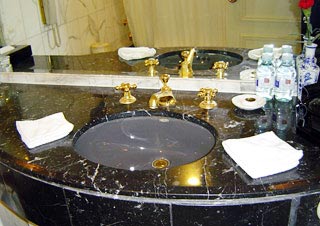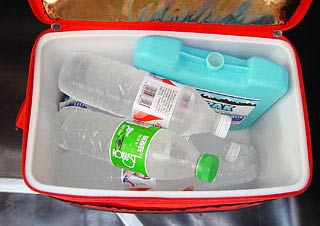Drinking Water in China
Tap water in China is undrinkable, but it is safe to use it for washing and for brushing your teeth. Travelers can drink boiled water or easily find bottled water in convenient stores everywhere.
 |
| Tap water is not drinkable. |
Can I drink the tap water in China?
No, the tap water in China is not safe to drink. Unlike most western countries where there is easy access to safe tap water, in most places in China the tap water, although it looks clear, is not safe for drinking unless it has been boiled. Even in big cities like Beijing and Shanghai, water from the tap is not well filtered, sterilized, or purified, and may carry hazardous contaminants like sediments, rusts, bacteria, virus, chlorines, or other heavy metals. Sicknesses like diarrhea caused by drinking unclean water may spoil your trip.
Is it ok to brush your teeth with tap water in China?
Yes. There shouldn't be any problem if you use the tap water to take a shower, brush your teeth, or wash your face, hands, or clothes. You can be at ease when doing such washing just like all Chinese do.
If you are concerned, you can use boiled or bottled water to brush your teeth and rinse your mouth. In addition, you should always peel fruit even if you have washed it with tap water.
Where can I get potable water?
For drinking, one can easily buy cheap and safe bottled mineral water for as little as CNY 2. Quality popular brands include Nongfu Spring, Nestle, C'estbon, Evian, Kunlun Mountains, and Wahaha. Various kinds of bottled tea and juice are also available.
Alternatively, you can use the boiler provided in the hotel room to boil the tap water, and then wait for it to cool down to be drinkable. You can also put boiled water in your thermos to take when you leave the hotel.
1. Drinking Water in Hotels
Some hotels are facilitated with a dispenser that delivers both cool and hot potable water, while some are equipped with a heater or thermos. You can use the heater to boil water or use the boiled water directly from the thermos free of charge. Good hotels may supply high-quality bottled mineral water for a minimal charge.
2. Drinking Water in Restaurants
Water is served for free before the meal in most Chinese restaurants, and some even offer tea or soup. The water offered has always been boiled, and it is served hot or warm as Chinese people believe drinking cold water may not be good for your health. Most restaurants also have bottled water or other beverages on their menu. However, you must pay for them and the price is usually higher than in the supermarkets. Note that some restaurants may sell cold drinks, but without ice.
3. Drinking Water in Tourist Sites
Only a few tourist sites, like the Shanghai Disneyland and Hangzhou West Lake, offer free drinkable tap water. In most sites there are stores or vendors selling bottled drinks, but the price may be a bit higher than that sold outside. In some mountain sites, because of delivery difficulty, the price is several times higher than that in supermarkets. Therefore, you are suggested to buy water before going to scenic areas, particularly when you travel to places like Mt. Emei, Mt. Huashan, and Yellow Mountain.
4. Drinking Water in Airports & Railway Stations
At the airports and train stations there are stores selling bottled drinks although the price may be a bit higher than elsewhere. There are also dispensers for both cold and hot boiled water that you can use if you have brought a container with you. The trains also have boiled water dispensers, but you need to bring your own cup or bottle.
|
|
Notes
1. Bottled water is mostly stored in plastic containers. Once it is opened, it's recommended that you drink it up within one week. After more than 7 days, the water can cause health problems as bacteria may become present, especially in summer.
2. When buying bottled water, make sure the water is transparent, free of any form of deposits, and the bottle is smooth and clear. Also check the date of production, shelf life, and whether the seal is intact.
By the way, you can also pay by cash. Cash refusal is illegal in China. But you may need to bring some changes, too.

